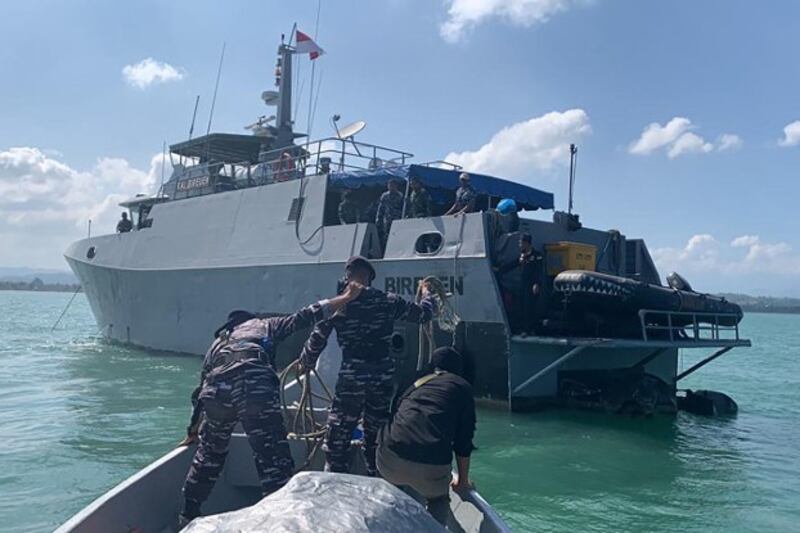Indonesia agreed to allow about 120 Rohingya stranded on a boat near Aceh province to come ashore, officials said Wednesday, after two days of pressure from locals, human rights groups and the United Nations refugee agency.
Spotted by local fishermen on Sunday, the Rohingya were being allowed in because it was an emergency situation, officials said, after the UNHCR said their boat had engine trouble.
“The Indonesian government has decided today, Wednesday, Dec. 29, 2021, on humanitarian grounds, to accommodate the Rohingya refugees who are currently drifting on a ship in the sea near Bireuen regency, Aceh,” said Armed Wijaya, chairman of the government’s Task Force for Handling Refugees from Overseas.
“This decision was made after considering the emergency situation experienced by the refugees on the ship,” he said in a statement.
The vessel was drifting about 50 nautical miles off the coast of Bireuen and will be towed ashore, Armed said. Its passengers were mostly women and children but the exact number was not immediately known.
All on the boat will undergo health screening for data collection and implementation of health protocols amid the pandemic, he said.
On Tuesday, an Indonesian official had said the Rohingya would be provided with food and fuel so they could continue their journey to Malaysia, their original destination. Local officials said they had limited resources to care for the refugees as the country grapples with the COVID-19 pandemic.
Armed said the migrants should have been brought to land when their boat was stranded on Sunday.
“They should have been allowed [to come ashore] from the start because all the elements of an emergency are fulfilled. After this, the government must not be late in taking action and must be responsive,” he said.
Reza Maulana, chairman of the humanitarian organization Geutanyoe Foundation, said representatives of the fishing community were pushing for the Rohingya to be taken to shore on Wednesday.
“As we speak the boat has not been towed, but it will likely be pulled to the coast today. Maybe tonight if possible,” he told BenarNews, an RFA-affiliated online news service.
Reza said contrary to previous reports, the boat did not have a leak, but its engine stalled. Bad weather including thunderstorms had caused the boat to take on water, creating a danger of capsizing.
The Rohingya will be under the care of the UNHCR pending verification of their refugee status, according to Reza.
Meanwhile, the Maritime Security Agency (Bakamla) said aid supplies including food, fuel, clothing and medicines had been delivered to the boat.
“The assistance was delivered directly to the Lhokseumawe naval base commander and the police,” Bakamla said in a written statement.

'Matter of life and death'
Amnesty International welcomed the government’s decision to take in the Rohingya, saying it was in line with the country’s international obligations.
“We really hope that the refugees will immediately get basic services after going through dangerous and exhausting conditions while at sea, including health, food and psychological counseling,” Usman Hamid, Amnesty’s executive director in Indonesia, told BenarNews.
Based on a 2016 presidential regulation, the Indonesian government has an obligation to rescue refugees who are in distress, Armed said.
Usman said the government should have taken swifter action.
“Every hour is a matter of life and death at sea,” he said.
Since a brutal crackdown by security forces in Myanmar’s Rakhine state against the Rohingya in 2017, hundreds have paid traffickers to transport them to Thailand and Malaysia. The Rohingya hope to find work away from Myanmar or crowded refugee camps in neighboring Bangladesh.
Since the 2017 crackdown, about 740,000 Rohingya who fled Myanmar settled in camps in and around Bangladesh’s Cox’s Bazar, now home to about 1 million of the refugees.
Over the years, groups of Rohingya have packed into boats and sailed off in search of asylum in other countries, but have often been refused entry.
As of October, at least 665 Rohingya ended up stranded in Indonesia on their way to third countries including Malaysia and Australia, according to UNHCR.
Indonesia is not a party to the U.N.’s 1951 Refugee Convention or its 1967 Protocol Relating to the Status of Refugees. It prohibits refugees from obtaining jobs and attending formal schools.
Reported by BenarNews, an RFA-affiliated online news service.

